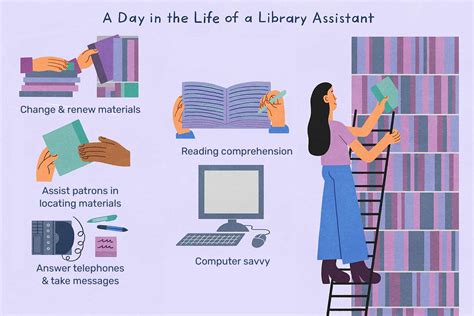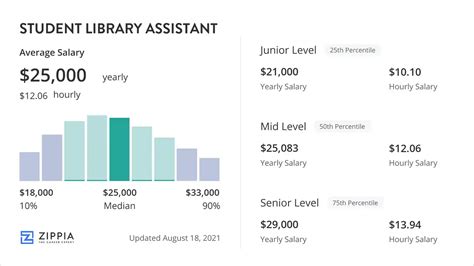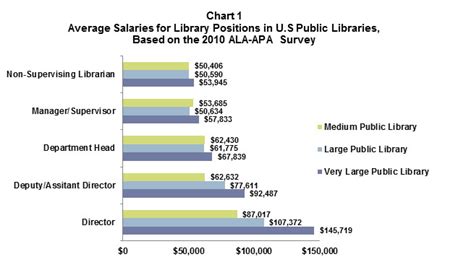A career as a library assistant is a gateway to a world of information, community service, and lifelong learning. It's a role that places you at the very heart of a library's operations, making you an essential resource for patrons and staff alike. But beyond the passion for books and knowledge, what can you expect to earn?
This guide provides a data-driven look at library assistant salaries across the United States. While the national median salary for library assistants and technicians is approximately $39,630 per year, your actual earnings can vary significantly, with experienced professionals in high-demand areas earning upwards of $58,000 annually.
We'll break down the key factors that influence your earning potential, from your level of education and experience to the type of library you work in, helping you navigate your career path with confidence.
What Does a Library Assistant Do?

Before diving into the numbers, it’s important to understand the role. Library assistants are the operational backbone of the library. They are often the first point of contact for patrons and are responsible for a wide range of tasks that ensure the library runs smoothly.
Key responsibilities typically include:
- Patron Services: Assisting visitors with locating materials, checking books in and out, issuing library cards, and answering general questions.
- Shelving and Organization: Sorting, shelving, and organizing books, periodicals, and other media according to the library's classification system.
- Material Processing: Preparing new materials for circulation by applying barcodes, spine labels, and protective covers.
- Clerical and Administrative Tasks: Managing overdue notices, collecting fines, and assisting with data entry.
- Program Support: Helping librarians prepare for and run events like story times, workshops, and community outreach programs.
In essence, they create a welcoming and efficient environment for everyone who walks through the library's doors.
Average Library Assistant Salary

Salary data shows a broad range for library assistants, reflecting the diverse nature of the role. Here’s a look at what you can expect based on authoritative sources.
The U.S. Bureau of Labor Statistics (BLS) reports that the median annual wage for library technicians and assistants was $39,630, or $19.05 per hour, as of May 2023. This is the midpoint, meaning half of the workers in the profession earned more than that amount and half earned less.
The salary spectrum is wide:
- The lowest 10% earned less than $26,450.
- The highest 10% earned more than $58,740.
Reputable salary aggregators provide a similar picture:
- Salary.com places the average Library Assistant I salary in the U.S. between $33,656 and $45,053, with a median of around $39,000.
- Payscale reports an average hourly rate of $16.32, with a typical range from $12.00 to $22.00 per hour, depending heavily on experience and location.
- Glassdoor estimates a total pay range of $32,000 to $50,000 per year, with an average salary of approximately $40,000 based on user-submitted data.
This data clearly shows that while the entry-level salary may be modest, there is significant room for growth as you gain skills and experience.
Key Factors That Influence Salary

Your salary isn't just a single number; it's a reflection of several interconnected factors. Understanding these variables is key to maximizing your earning potential.
###
Level of Education
While a high school diploma is often the minimum requirement for entry-level positions, further education can directly impact your pay and career trajectory.
- High School Diploma: Qualifies you for most entry-level assistant roles, typically at the lower end of the pay scale.
- Library Technical Assistant (LTA) Certificate or Associate's Degree: These specialized programs provide formal training in library science principles, cataloging, and information technology. Graduates are often preferred by employers and can command a higher starting salary or qualify for more advanced "Library Technician" roles, which generally pay more than assistant positions.
- Bachelor's Degree: A four-year degree, even in an unrelated field, can make you a more competitive candidate, particularly in academic or special libraries. It may also be a stepping stone toward pursuing a Master of Library and Information Science (MLIS), the standard requirement for becoming a librarian.
###
Years of Experience
Experience is one of the most significant drivers of salary growth. As you build a track record of reliability and master a wider range of library functions, your value to an employer increases.
- Entry-Level (0-2 years): You can expect a salary at the lower end of the spectrum, typically in the $28,000 to $35,000 range, while you learn the core functions of the role.
- Mid-Career (3-9 years): With several years of experience, you can handle more complex tasks with less supervision. Your salary will likely move closer to the national median, in the $36,000 to $45,000 range.
- Senior/Experienced (10+ years): Highly experienced assistants and technicians who may supervise others, manage specific departments (like circulation or interlibrary loans), or possess specialized technical skills can earn at the top end of the scale, from $46,000 to over $58,000.
###
Geographic Location
Where you work matters—a lot. Salaries for library assistants vary dramatically by state and even between urban and rural areas, largely due to differences in cost of living and local government funding.
According to the BLS, the top-paying states for library technicians and assistants are:
1. District of Columbia: $61,460
2. Washington: $52,530
3. California: $51,190
4. Massachusetts: $50,290
5. Maryland: $49,540
Conversely, states with a lower cost of living tend to have salaries below the national median. Working in a major metropolitan area will almost always yield a higher salary than a similar role in a small, rural town.
###
Company Type
The type of institution you work for is another major determinant of your pay. The BLS provides a breakdown of median annual wages by industry:
- Colleges, Universities, and Professional Schools: $45,560
- Local Government (Public Libraries): $37,550
- Elementary and Secondary Schools: $36,890
- Special Libraries (Corporate, Law, Medical): These libraries, while a smaller part of the job market, often offer higher salaries due to the specialized knowledge required to support their parent organizations. Pay can be well above the national median, especially in fields like law or corporate research.
###
Area of Specialization
Developing specialized skills can set you apart and lead to higher-paying opportunities. Consider focusing on high-demand areas:
- Technical Services: Assistants skilled in cataloging, acquisitions, and Integrated Library System (ILS) management are highly valued.
- Digital and Electronic Resources: Expertise in managing e-books, online databases, and digital archives is increasingly critical for modern libraries.
- Children's or Young Adult (YA) Services: Assistants who excel at developing and running programming for youth can become indispensable to a public library's community mission.
- Archives and Special Collections: Working with rare or historical materials often requires specialized training in preservation and archival science, which can command higher pay.
Job Outlook

The U.S. Bureau of Labor Statistics projects a 2% decline in employment for library technicians and assistants from 2022 to 2032. This is primarily due to budget constraints in local governments and educational institutions, as well as the automation of some routine tasks.
However, this figure shouldn't be discouraging. The BLS still anticipates about 8,900 openings each year, on average, over the decade. These openings will primarily arise from the need to replace workers who retire or transition to different occupations.
Candidates who are adaptable and possess strong technological skills—especially in digital media, data management, and patron-facing technology—will have the best job prospects.
Conclusion

A career as a library assistant offers a stable and rewarding path for those passionate about fostering knowledge and serving their communities. While starting salaries are modest, this guide demonstrates clear pathways to increasing your earnings.
Key Takeaways:
- The national median salary is around $39,630 per year, with a potential range from under $27,000 to over $58,000.
- Your salary is heavily influenced by your experience, geographic location, and the type of library you work for.
- Pursuing specialized education (like an LTA certificate) and developing in-demand skills (especially in technology) are the most effective ways to boost your earning potential.
For anyone considering this career, the opportunities are there. By being strategic about your professional development, you can build a fulfilling and financially sound career as a valued library professional.
